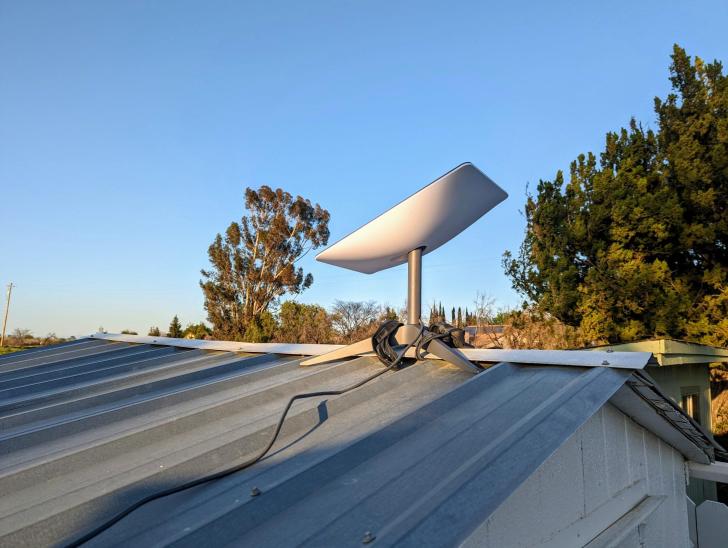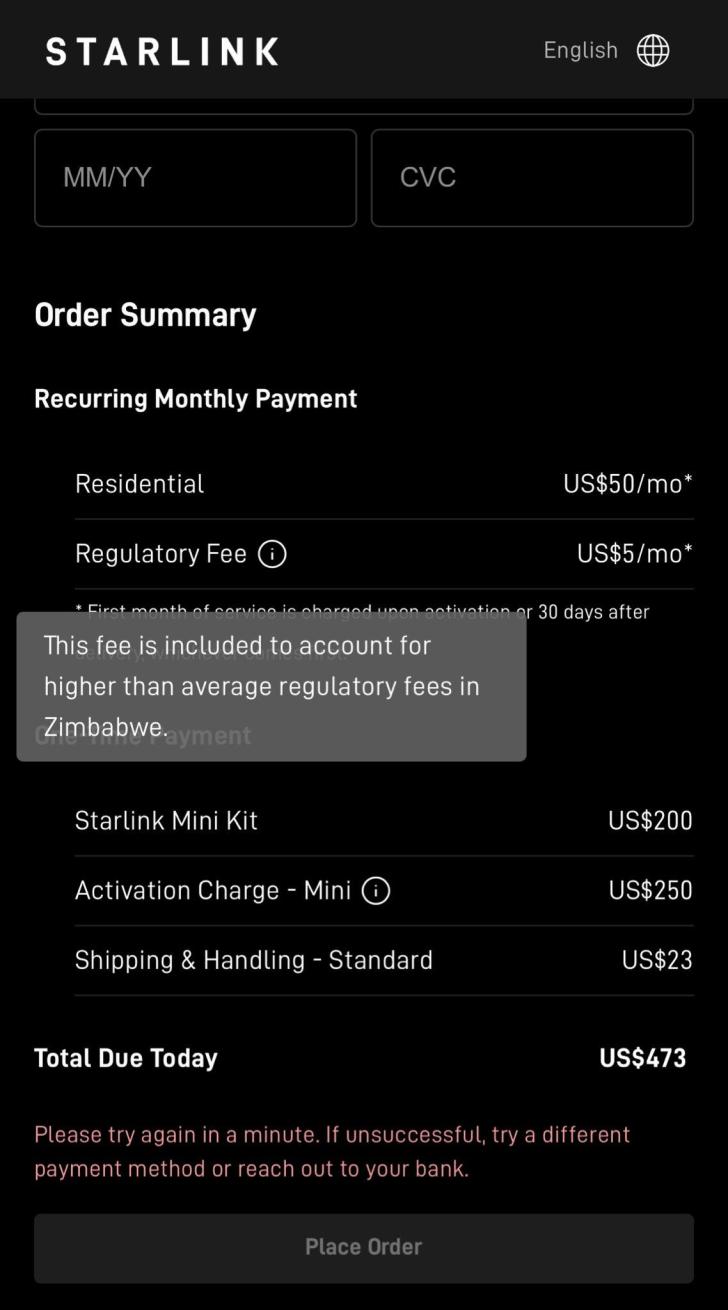Technology / Internet
Starlink users in Zimbabwe pay USD$5 regulatory fee
17 Aug 2025 at 11:43hrs |
707 Views

The launch of Starlink in Zimbabwe was initially met with excitement, promising high-speed, reliable, and affordable internet in a country long plagued by erratic connectivity and steep costs. However, that optimism is being tempered by revelations that Zimbabwean users are paying more than customers in any other country, thanks to a USD $5 regulatory fee imposed by the government. Starlink itself notes on its official site, "The fee is included to account for higher than average regulatory fees in Zimbabwe."
While Starlink's standard residential package costs USD $45 per month in Rwanda and Sierra Leone, and USD $30 in Zambia, Zimbabweans are paying USD $50 - a roughly 11% mark-up. This additional fee, unique to Zimbabwe, raises questions about why the country imposes such high regulatory costs compared to its neighbors.

Starlink, owned by Elon Musk's SpaceX, operates in over 130 countries with pricing adjusted for local taxes, licensing, and regulatory costs. Yet Zimbabwe stands out as the only nation with an explicit "Regulatory Fee" added on top of the subscription. In comparison, fiber and broadband users in countries like Ukraine, China, and Russia pay less in total fees than Starlink users in Zimbabwe.
The country's telecommunications sector is heavily regulated. The Postal and Telecommunications Regulatory Authority of Zimbabwe (POTRAZ) requires foreign providers to pay substantial fees for market entry and spectrum usage. Unlike other nations that promote digital inclusion through tax breaks or subsidies, Zimbabwe imposes additional levies on foreign-based services like Starlink, forcing operators to pass the costs on to consumers.
Zimbabwe already charges mobile operators and local ISPs significant regulatory fees, which are typically reflected in service prices. The Starlink USD $5 monthly fee appears disproportionate, particularly when compared to Eswatini, which also charges USD $50 but has a far lower reliance on Starlink and significantly cheaper local ISPs. In Zimbabwe, where the leading ISP costs roughly USD $221.74, Starlink is positioned as a relatively cheaper alternative, making the additional charge especially burdensome.
Although USD $5 may seem minor, for many Zimbabweans it represents a significant cost. With the country's average monthly wage hovering around USD $200, the extra USD $60 per year reduces affordability for low-income households and small businesses. Attempts to bypass the fee, such as importing Starlink kits from neighboring countries or using roaming options, are not viable in Zimbabwe due to regulatory restrictions.
Globally, the U.S. imposes some of the highest telecommunications regulatory fees, with carriers contributing about 25% of interstate revenues to programs like rural broadband expansion. Zimbabwe's USD $5 monthly charge may support regulatory oversight, but its specific allocation remains unclear. Compared to other nations, Zimbabwe's approach appears unnecessarily restrictive, undermining the promise of universal and affordable internet access.
Unless regulators reconsider these fees, the vision of reliable, cost-effective internet for all Zimbabweans risks remaining just that - a vision. The high cost of Starlink in Zimbabwe is a stark reminder that regulatory policy can make or break digital inclusion efforts.
While Starlink's standard residential package costs USD $45 per month in Rwanda and Sierra Leone, and USD $30 in Zambia, Zimbabweans are paying USD $50 - a roughly 11% mark-up. This additional fee, unique to Zimbabwe, raises questions about why the country imposes such high regulatory costs compared to its neighbors.

Starlink, owned by Elon Musk's SpaceX, operates in over 130 countries with pricing adjusted for local taxes, licensing, and regulatory costs. Yet Zimbabwe stands out as the only nation with an explicit "Regulatory Fee" added on top of the subscription. In comparison, fiber and broadband users in countries like Ukraine, China, and Russia pay less in total fees than Starlink users in Zimbabwe.
Zimbabwe already charges mobile operators and local ISPs significant regulatory fees, which are typically reflected in service prices. The Starlink USD $5 monthly fee appears disproportionate, particularly when compared to Eswatini, which also charges USD $50 but has a far lower reliance on Starlink and significantly cheaper local ISPs. In Zimbabwe, where the leading ISP costs roughly USD $221.74, Starlink is positioned as a relatively cheaper alternative, making the additional charge especially burdensome.
Although USD $5 may seem minor, for many Zimbabweans it represents a significant cost. With the country's average monthly wage hovering around USD $200, the extra USD $60 per year reduces affordability for low-income households and small businesses. Attempts to bypass the fee, such as importing Starlink kits from neighboring countries or using roaming options, are not viable in Zimbabwe due to regulatory restrictions.
Globally, the U.S. imposes some of the highest telecommunications regulatory fees, with carriers contributing about 25% of interstate revenues to programs like rural broadband expansion. Zimbabwe's USD $5 monthly charge may support regulatory oversight, but its specific allocation remains unclear. Compared to other nations, Zimbabwe's approach appears unnecessarily restrictive, undermining the promise of universal and affordable internet access.
Unless regulators reconsider these fees, the vision of reliable, cost-effective internet for all Zimbabweans risks remaining just that - a vision. The high cost of Starlink in Zimbabwe is a stark reminder that regulatory policy can make or break digital inclusion efforts.
Source - techmag
Join the discussion
Loading comments…




























